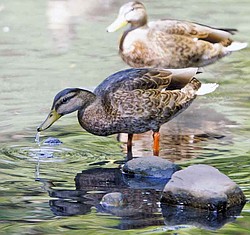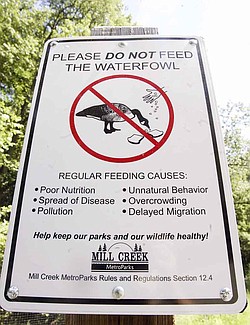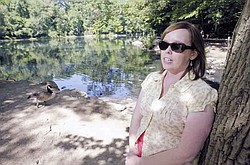Feeding fouls fowls
Mill Creek MetroParks staff recently erected several “Do Not Feed” signs at the Lily Pond. These signs let visitors know that regular feeding of ducks and geese causes pollution, poor nutrition and overcrowding, among other things. It’s also against park policy.
Kirsten Peetz, environmental-land manager for Mill Creek MetroParks, discusses why the park system put up six signs discouraging visitors from feeding the waterfowl at the Lily Pond in Youngstown.
By Elise Franco
Youngstown
Tossing bread to waterfowl sometimes is a common occurrence at ponds and lakes, but Mill Creek MetroParks workers say it’s bad for the animals and against park policy.
Kirsten Peetz, MetroParks environmental-land manager, said about six signs recently were posted at the Lily Pond off McCollum Road to inform visitors that feeding the ducks and geese is not allowed. Peetz said the signs also educate the public as to why.
“When people feed the birds, they become reliant on that food,” she said. “Bread isn’t really an appropriate food for wild birds — especially old, moldy bread.”
Peetz said that when the Canada geese get used to being fed, they begin to gather, and they bring their young, making it a generational problem.
“When geese congregate, they trample; there’s a lot of fecal matter,” she said. “They nest in nearby areas then parade their
ducklings down to the pond because they know people will feed them.”
The Lily Pond, which is the oldest man-made body of water in the MetroParks, has suffered, partially as a result of geese and duck congregation, Peetz said.
The once-clear pond water is now a dingy brown from years of fecal contamination and sediment displacement, and the area around the water’s edge is dirt instead of grass because the waterfowl trample down the vegetation.
Linda Kostka, marketing and development director, said the MetroParks is beginning a project to renovate and clean the Lily Pond and its surroundings.
“We’re going to do some planting and redo some of the drainage and parts of the trail,” she said. “Hopefully, we’ll be able to bring the pond back to what it was 30 or 40 years ago.”
Peetz said the pond’s aesthetics are just as important as its environmental quality.
“This area is what people see,” she said. “The water coming down from a spring up the hill is clean, so we’d like to do what we can to clean the pond itself and make it a nice place to bring your family.”
Kostka said the Metro-Parks has approached the Youngstown State University geology department about conducting a survey of the pond to determine the water’s depth and the amount of sediment that sits at the bottom.
“We need to know that information before we can determine how much the renovation will cost,” she said.
Jeffrey Dick, geology department chairman, said he plans to sit down with MetroParks staff in the next month or so to discuss the survey.
Kosta said the problem isn’t isolated to the Lily Pond. “Anywhere you have water, you have the same issues.”
Peetz said she hopes eventually the MetroParks will offer alternatives for those who do enjoy feeding the birds.
“We’re looking into a dispenser or some other option where we could provide the appropriate foods,” she said. “We don’t want to take away that experience, because we realize families do enjoy it.”
 43
43



